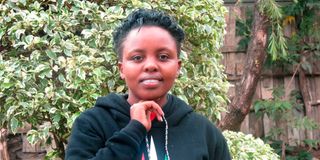Tribeless youth: Where a hashtag became a young people's movement

Wanjiku Kihika, 23, is the CEO of Tribeless Youth.
Wanjiku Kihika is the Executive Director of Tribeless Youth, an initiative that started off as a hashtag, which aims to instil positive identity among young people.
“For a long time, the youth have been used by politicians to spread tribal hatred, stereotypes and animosity,” comments Wanjiku, pointing out that even though since independence, Kenya’s politics has been characterised by ethnic tensions, it was not until the 2007/2008 General Election that the full extent of tribalism reared its ugly head. But even after Kenyans witnessed what tribalism was capable of, this toxic dynamic still simmers, and is largely to blame for many ills in the country such as corruption, ethnic clashes, various forms of inequality and underdevelopment.
It is against this backdrop, that Tribeless Youth sought to change the script. The initiative was founded with the goal of not only promoting peaceful coexistence among the youth of Kenya, but also to demystify the ideology of ‘my tribe, my people’ syndrome, which has been used to unfairly allocate resources, positions within government and private sector and favouritism based on one’s tribe.
“Our starting capital was human capital. We started off with no financial capital at all, other than the social capital we had built online. From a hashtag, we were able to attract an initial funding of Sh2.5 million from Hivos’ Resource for Open Minds. Eventually, we have been able to work with Ford Foundation, National Endowment for Democracy, ForumCIV, Voice Global, Article 19, Konrad Adenauer and Amnesty Kenya,” she says, adding that they are on a mission to augment the innovation and power of the youth to creatively educate and inspire a socio-political conscious generation of change-makers, while encouraging young people to view their identity and heritage positively without the negative tribal connotations.
Tribeless Youth is now registered as a Community Based Oorganisation in Nakuru County and is anchored by Article 10 and Chapter 55 of the constitution of Kenya 2010.
“We work towards the fulfilment of democracy and good governance, invest in the storytelling ability that most Africans possess and work with people who have lived experiences through the agony of past repression to tell stories of their struggle, we then have young people attend these sessions to learn and to create an inter-generational connection of struggles.”
The CBO also trains young people on how to claim political spaces by participating in development of their communities by being actively present during the County Integrated Development Plan and budget-making processes.
“Through partnership and teamwork, young people can lend their voice in such crucial matters and enhance transparency and accountability in the long run.”
She adds,
“We are enhancing the different abilities of young women in leadership and mentorship of young people active in politics by helping them analyse the context in which they work towards their inclusion. We also use artivism to create awareness by incubating artists who have an interest in using their work to advance social issues through the Usanii Ni Sauti project.”
The project is intended to impart artivists with knowledge on social, economic and political issues to help them develop their works to capture the audience on social, political and economic justice issues.
Tribeless Youth believes that young people are at the centre of the great digital advancements happening today owing to their close proximity to future digital innovations and transformation.
“They are major stakeholders in advancing digital rights and utilisation of digital media for social good. On this, we offer various training on digital security, rights and responsibilities and common utilisation. We also train on tools for digital advocacy and how to run impact campaigns.”
Their main challenge has been getting the funds to fulfil their mandate as they operate in a constrained funding environment being a CBO.
“Luckily, many donors and well-wishers are now warming up to the work that CBOs are doing,” she says.
Having to mobilise and work together with various government agencies such as security sectors and county governments, civil society organisations, private sector and institutions of higher learning to address problems that bedevil the country such as corruption and extrajudicial killings has been their highlight.
“Forging these partnerships has enabled us to work freely and express ourselves in ways that the society absorbs our message. Using a variety of art forms such as spoken word, poetry, illustrations, puppetry and music as forms of education, information and communication has also seen our work get appreciated and reach wider audiences.”
Their work has not gone unnoticed. In 2019, Wanjiku was the first runner-up in the Diversity and Inclusion Awards (DIAR) organised by the Daima Trust in partnership with National Cohesion and Integration Commission. The same year she was a TedX Speaker and recently received an honorary award by Great Rift Gospel Award for community service.





